It's unclear if Islas Marias ever really worked as a penal colony: The remote Mexican archipelago is battered regularly by hurricanes, and its ramshackle, often century-old installations are sprinkled with the ruins of failed "productive" projects that once aimed to make the prison population self-sustaining.
Now, with the prison just closed, the hurdles of distance, weather and decayed infrastructure may not make it easy for the islands to prosper in their new role as a nature center and education camp for children.
It's a rough, eight-hour boat ride out to the islands, which lie 70 miles (110 kilometers) off the Pacific shores of Mexico's Nayarit state. Appropriately for a place where most of the few dozen prisoners who attempted to escape drowned, the Environment Department says it is thinking about offering survival courses. Bird watching, nature walks and arts programs are also planned.
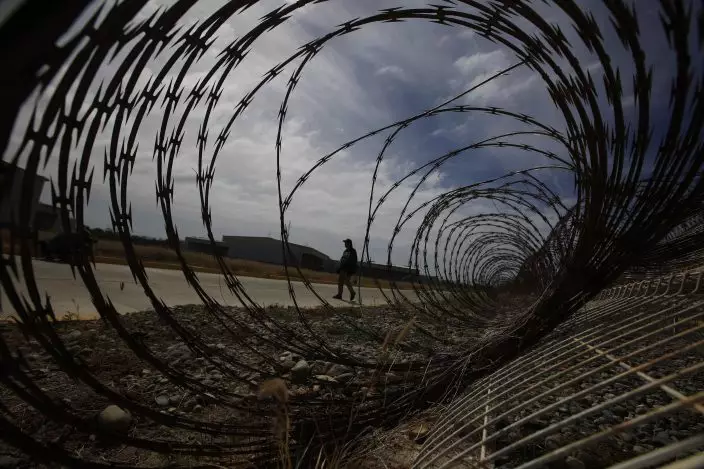
A journalist walks past a fallen section of fencing during a media tour of the now closed Laguna del Toro maximum security facility on the former Islas Marias penal colony located off Mexico's Pacific coast, Saturday, March 16, 2019. All that remains for now are a few goats, some cattle and once-domesticated cats that roam the main island where thousands of prisoners once lived. (AP PhotoRebecca Blackwell)
All that remains for now are a few goats, some cattle and once-domesticated cats that roam the main island where thousands of prisoners once lived.
The thick-walled remains of an old salt-evaporation warehouse and the disused pools of a former shrimp farm are a mute testament to the idea that Islas Marias was founded on in 1905 — that penal colonies could earn their keep, and reform inmates through clean living, ocean air and hard work.
Bars and cells weren't necessary because the surrounding ocean effectively prevented escape. Islas Marias was the last of its kind, the final of a half dozen island penal colonies that were scattered around Latin America. It was done in by high costs — almost $150 per day per inmate, far beyond what mainland prison costs — and by the increasing space available at mainland prisons as legal reforms reduced jail populations.

A prison guard shows a key inside the now closed Laguna del Toro maximum security facility during a media tour of the former Islas Marias penal colony located off Mexico's Pacific coast, Saturday, March 16, 2019. When it closed in February, the penal colony housed just 659 prisoners. (AP PhotoRebecca Blackwell)
Rogelio Zedillo, a former employee in the island's legal area, is one of the believers in the penal colony. Some of his fellow prison employees even want to stay on and are trying to swing transfers to the Environment Department, which will now oversee the islands.
"I think it's a pity that they have closed what could have been a model prison," Zedillo said. "They were self-supporting, they (inmates) were producing. They grew vegetables. They had cattle, goats, pigs. There was a fish farm and a salt works ... the problem was political, the authorities decided not to continue as a penal colony, and so little by little it fell apart."
Prison official Marco Antonio Rugerio Estrada spent the past 31 years on the main island, known as Maria Madre. He also is sad to see the prison go.
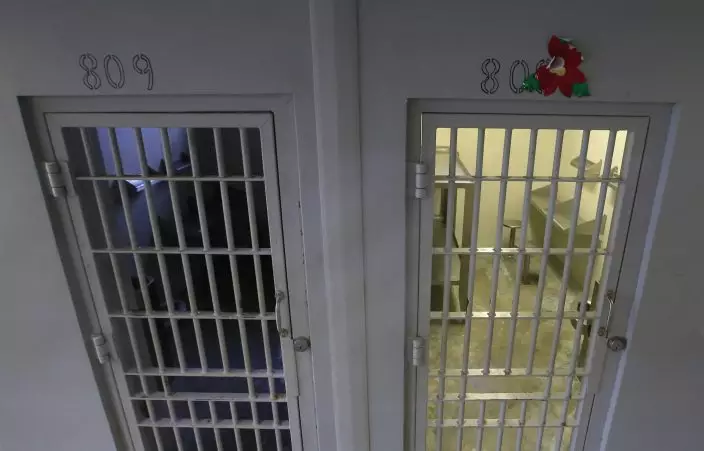
A foil flower adorns the entrance to a cell that once housed two prisoners at the maximum security Laguna del Toro facility during a media tour of the now closed Islas Marias penal colony located off Mexico's Pacific coast, Saturday, March 16, 2019. Bars and cells were limited to the maximum security facility because the surrounding ocean effectively prevented escape. (AP PhotoRebecca Blackwell)
"It was a very healthy life," Rugerio Estrada said. "We started off every day in a very beautiful environment, and that allows you to see life in a different way. You wake up and say, 'I am in a very pretty place,' and you start to recognize yourself."
But it was far from a tropical paradise for the inmates. They weren't allowed to go the island's beaches. They led a fairly regimented life, with designated areas, bunk beds in small houses and 5 a.m. morning wake-up calls.
Officials say inmates also brewed homemade liquor out of fermented fruit and some tried to grow marijuana. The moonshine, known on the island as "turbo," led to a ban on the possession of sugar by inmates, since it accelerated the fermentation process.
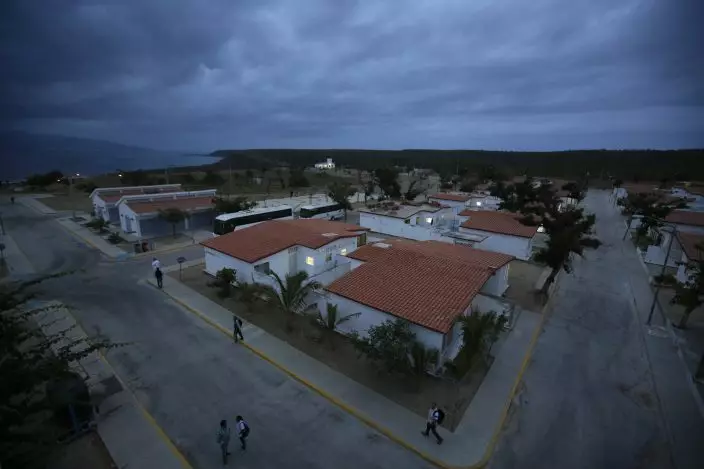
Journalists walk through streets of bungalows that once served as prison dormitories at the Morelos detention center during a media tour of the now closed Islas Marias penal colony located off Mexico's Pacific coast, at dawn Saturday, March 16, 2019. The penal colony was done in by high costs, almost $150 per day per inmate, far beyond what mainland prison costs, and by the increasing space available at mainland prisons as legal reforms reduced jail populations. (AP PhotoRebecca Blackwell)
The prison was started as a way to isolate and punish political prisoners, such as striking workers and socialists, and the inmates helped pay its way by working on the salt flats or at the shrimp farm. But in its waning years, salt could be harvested from evaporation ponds on the mainland more cheaply, and transportation costs for the island's shrimp production made it less profitable.
A further blow was the decision in 2006 during Mexico's drug war to turn the colony into a regular prison holding as many as 8,000 to 10,000 inmates. The "semi-freedom" the island once offered inmates, and the production schemes, suffered under the influx. The overcrowded, under-fed inmates rioted in 2013, killing six people before marines regained control of the island.
A final blow came this past October, when Hurricane Willa made a direct hit as a Category 3 storm and caused about $100 million in damages to the prison. Buildings can be seen around the island with their roofs torn off.
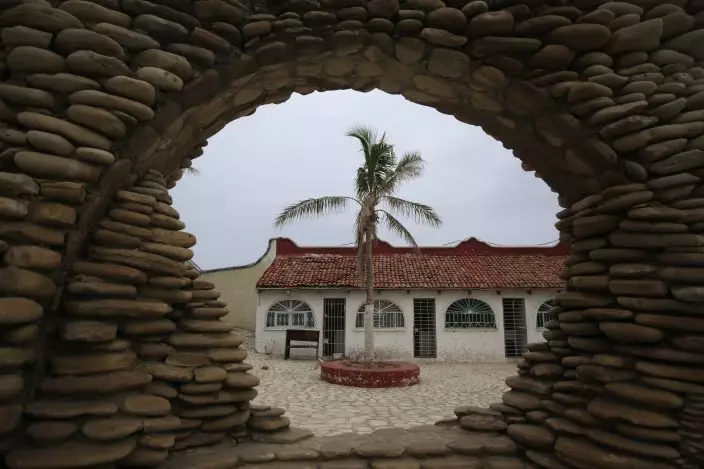
A former cell block is framed by a stone monument in Puerto Balleto, during a media tour of the now closed Islas Marias penal colony located off Mexico's Pacific coast, Saturday, March 16, 2019. Islas Marias was founded in 1905 on the idea that penal colonies could earn their keep and reform inmates through clean living, ocean air and hard work. (AP PhotoRebecca Blackwell)
When it closed in February, the penal colony housed just 659 prisoners.
One of the most charming of the prison's features — that families, including children, could come live with some inmates — also proved one of its most costly burdens. And people worried whether the kids were getting a decent childhood on the island and questioned the cost of providing schooling and recreational facilities.
"There are a lot of people in the non-prison population who deserve that funding, to live a decent life," said Francisco Garduno Yanez, director of Mexican prisons who was assigned with the task of shutting down the penal colony.

A box in the likeness of a home holds screws inside a workshop once used by prisoners to make handicrafts to sell for income, at the now closed Morelos detention center during a media tour of the former Islas Marias penal colony located off Mexico's Pacific coast, Saturday, March 16, 2019. "I think it's a pity that they have closed what could have been a model prison. They were self-supporting, they (inmates) were producing. They grew vegetables. They had cattle, goats, pigs. There was a fish farm and a salt works ... the problem was political, the authorities decided not to continue as a penal colony, and so little by little it fell apart," said Rogelio Zedillo, a former employee in the island's legal area, who is one of the believers in the penal colony. (AP PhotoRebecca Blackwell)
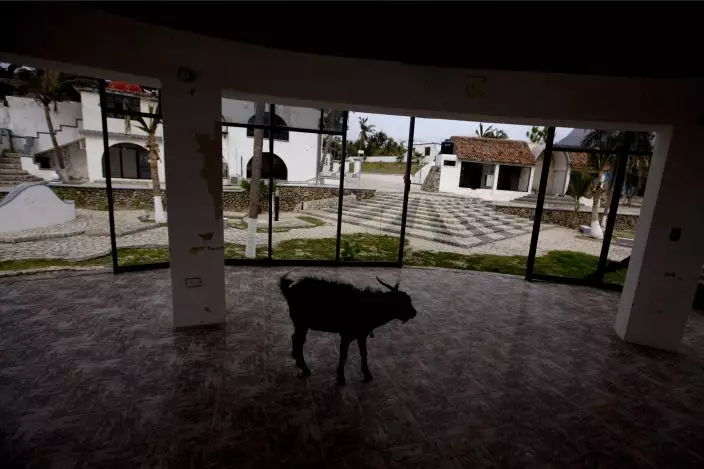
A goat wanders inside the shell of a building that was damaged in a 2018 hurricane in then staff area of Puerto Balleto during a media tour of the former Islas Marias penal colony off Mexico's Pacific coast, Saturday, March 16, 2019. With the prison just closed, the hurdles of distance, weather and decayed infrastructure may not make it easy for the islands to prosper in their new role as a nature center and education camp for children. (AP PhotoRebecca Blackwell)
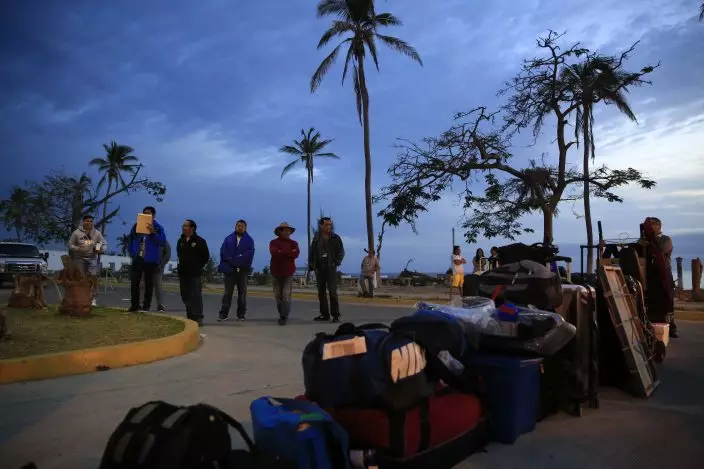
Prison employees who are being transferred to jails in other parts of Mexico wait to have their belongings inspected by security dogs before boarding a Naval ship, during a media tour of the now closed Islas Marias penal colony located off Mexico's Pacific coast, at dawn Sunday, March 17, 2019. Some of prison employees want to stay on and are trying to get transfers to the Environment Department, which will now oversee the islands. (AP PhotoRebecca Blackwell)
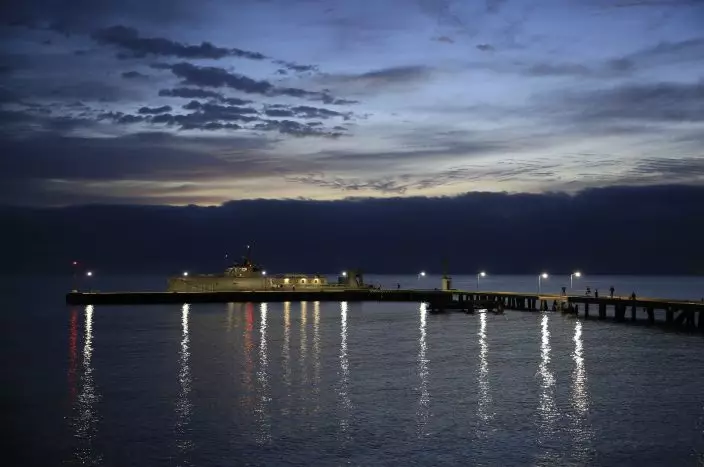
A Navy ship waits at the dock in Puerto Balleto to transfer prison staff to other jails in Mexico, at the end of a media tour of the Islas Marias penal colony located off Mexico's Pacific coast, at dawn Sunday, March 17, 2019. It's a rough, eight-hour boat ride out to the islands, which lie 70 miles (110 kilometers) off Mexico's Nayarit state. (AP PhotoRebecca Blackwell)
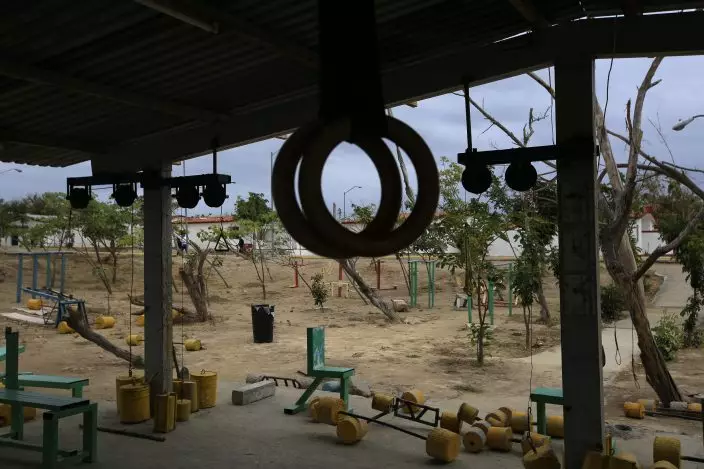
Weights made from cement lie scattered on the ground at an outdoor gym once used by prisoners at the now closed Morelos detention center during a media tour of the former Islas Marias penal colony located off Mexico's Pacific coast, Saturday, March 16, 2019. While one of the most charming of the prison's features, that families, including children, could come live with inmates, some people questioned whether the kids were getting a decent childhood on the island and questioned the cost of providing schooling and recreational facilities. (AP PhotoRebecca Blackwell)
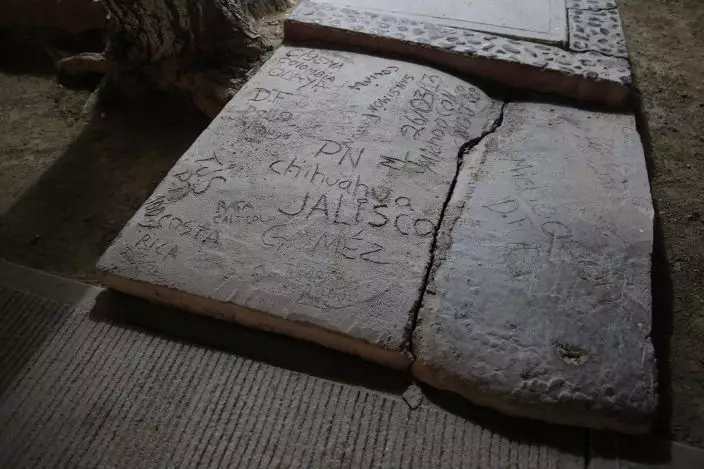
People's names and locations are carved into a cement walkway at the entrance to a prisoner bungalow at the Morelos detention center during a media tour of the former Islas Marias penal colony located off Mexico's Pacific coast, before dawn Sunday, March 17, 2019. It's unclear if Islas Marias ever really worked as a penal colony: The remote Mexican archipelago is battered regularly by hurricanes, and its ramshackle, often century-old installations are sprinkled with the ruins of failed "productive" projects that once aimed to make the prison population self-sustaining. (AP PhotoRebecca Blackwell)
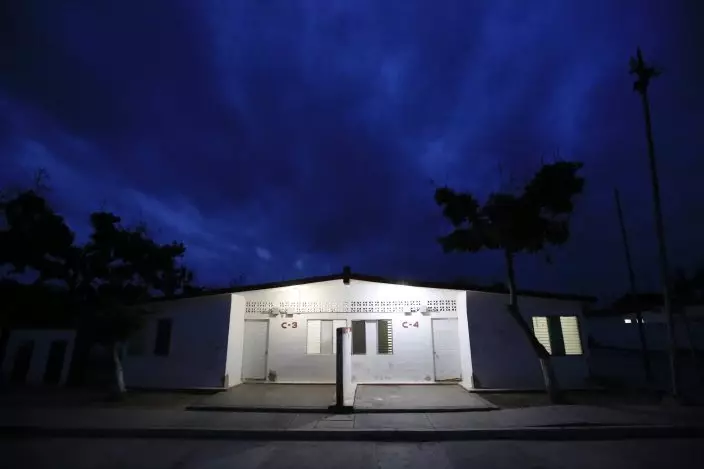
Numbers and letters mark bungalows, each of which housed 14-prisoners in bunk-bed dormitories with a shared, open bathroom, at the now closed Morelos detention center during a media tour of the former Islas Marias penal colony located off Mexico's Pacific coast, at dawn Saturday, March 16, 2019. The "semi-freedom" the island offered to inmates suffered under the influx of prisoners when in 2016 the colony was turned into a regular prison, triggering the overcrowded, under-fed inmates to riot in 2013, killing six people before marines regained control of the island. (AP PhotoRebecca Blackwell)
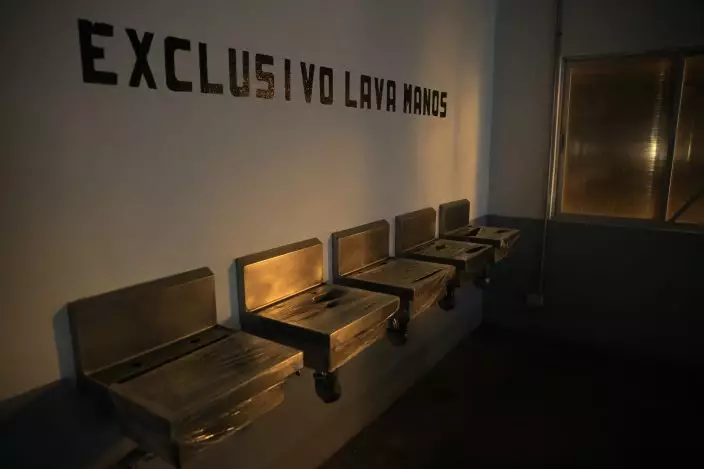
Sinks are covered with cling wrap, under the Spanish message: "Exclusively hand washing," at the dining hall of the now closed Morelos detention center during a media tour of the former Islas Marias penal colony located off Mexico's Pacific coast, late Friday, March 15, 2019. When it closed in February, the penal colony housed just 659 prisoners. (AP PhotoRebecca Blackwell)
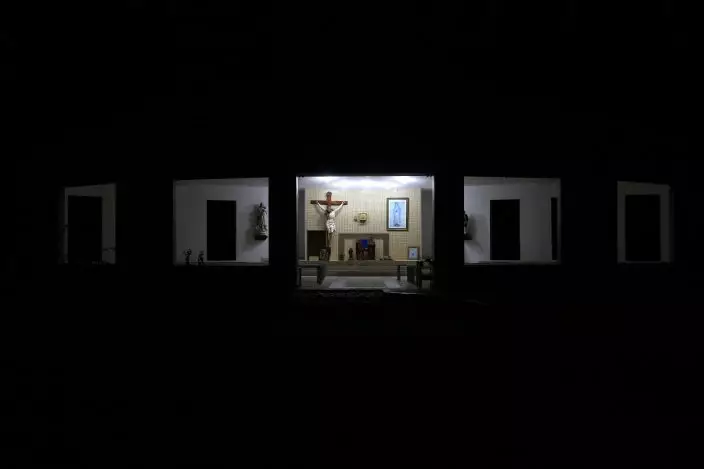
Lights illuminate an open-air Catholic church once used by prisoners at the now closed Morelos detention center during a media tour of the former Islas Marias penal colony located off Mexico's Pacific coast, before dawn Sunday, March 17, 2019. The colony was done in by high costs and by the increasing space available at mainland prisons as legal reforms reduced jail populations. (AP PhotoRebecca Blackwell)
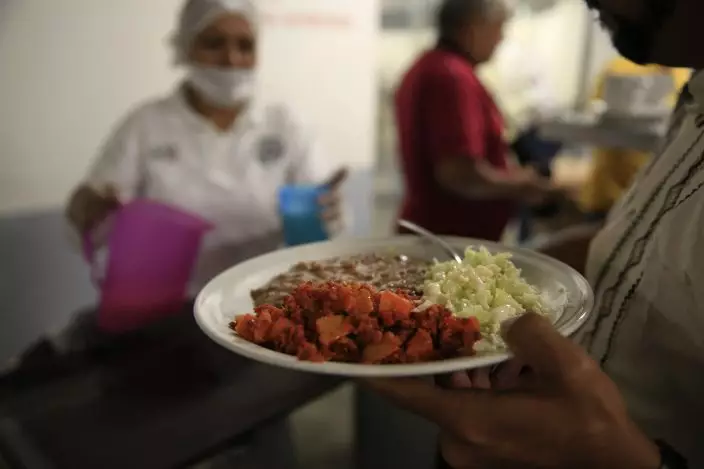
Workers serve dinner to journalists in the dining hall of the now closed Morelos detention center during a media tour of the former Islas Marias penal colony, located off Mexico's Pacific coast, late Friday, March 15, 2019. Officials say inmates brewed homemade liquor out of fermented fruit and some tried to grow marijuana. The moonshine, known on the island as "turbo," led to a ban on the possession of sugar by inmates, since it accelerated the fermentation process. (AP PhotoRebecca Blackwell)
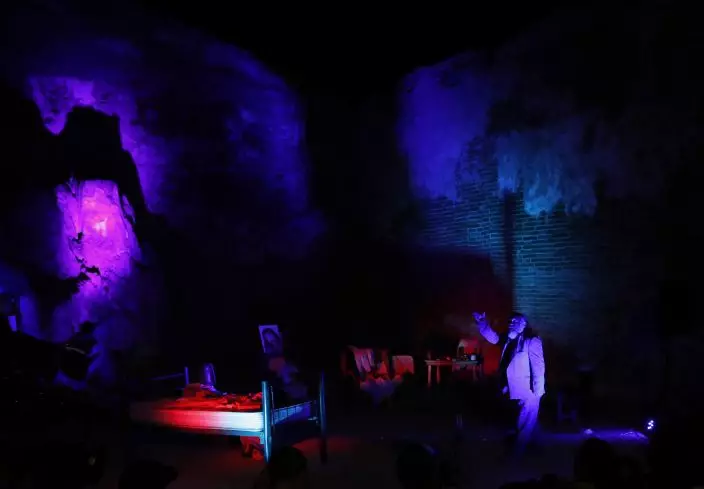
Actor Jorge Correa, who led social rehabilitation theater programs with inmates, performs a one-man play on addiction for a group of visiting journalists inside a ruined salt processing facility during a media tour of the former Islas Marias penal colony located off Mexico's Pacific coast late Friday, March 15, 2019. The century-old installations are sprinkled with the ruins of failed "productive" projects that once aimed to make the prison population self-sustaining. (AP PhotoRebecca Blackwell)
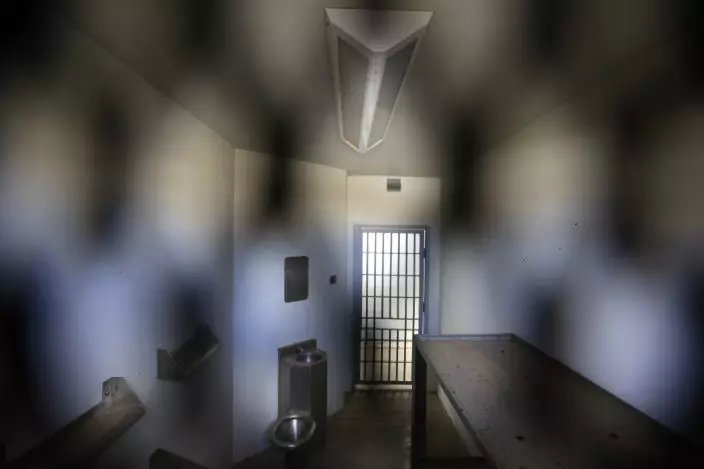
A two-person cell is seen through a gate at the Laguna del Toro maximum security facility during a media tour of the now closed Islas Marias penal colony located off Mexico's Pacific coast, Saturday, March 16, 2019. Bars and cells were limited to the maximum security facility because the surrounding ocean effectively prevented escape. (AP PhotoRebecca Blackwell)
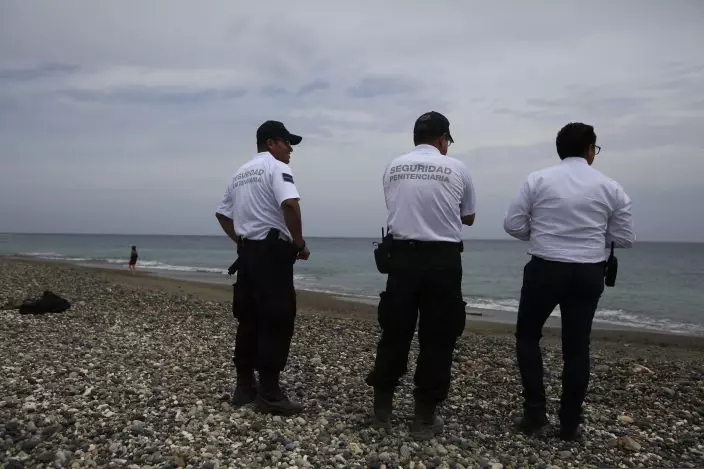
Prison guards stand on the shore of the Pacific Ocean during a media tour of the now closed Islas Marias penal colony, Mexico, Saturday, March 16, 2019. In a place where most of the few dozen prisoners who attempted to escape drowned, the Environment Department says it is thinking about offering survival courses, bird watching, nature walks and arts programs. (AP PhotoRebecca Blackwell)
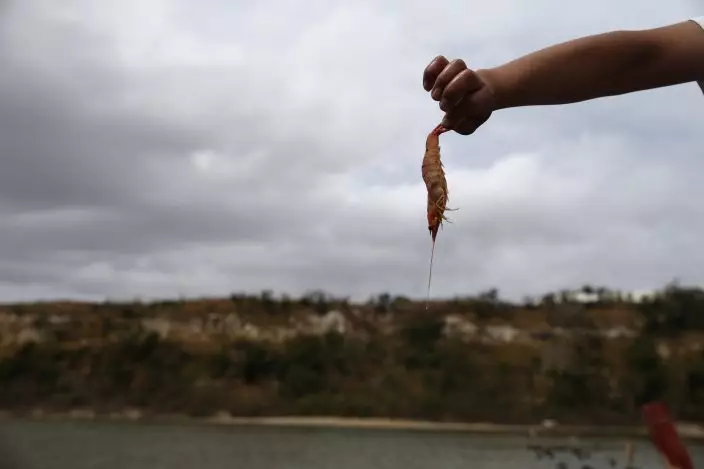
A journalist holds up a dead shrimp at an inactive shrimp farm during a media tour of the now closed Islas Marias penal colony, located off Mexico's Pacific coast, Saturday, March 16, 2019. The prison was started as a way to isolate and punish political prisoners, such as striking workers and socialists, and the inmates helped pay its way by working on the salt flats or at the shrimp farm. (AP PhotoRebecca Blackwell)
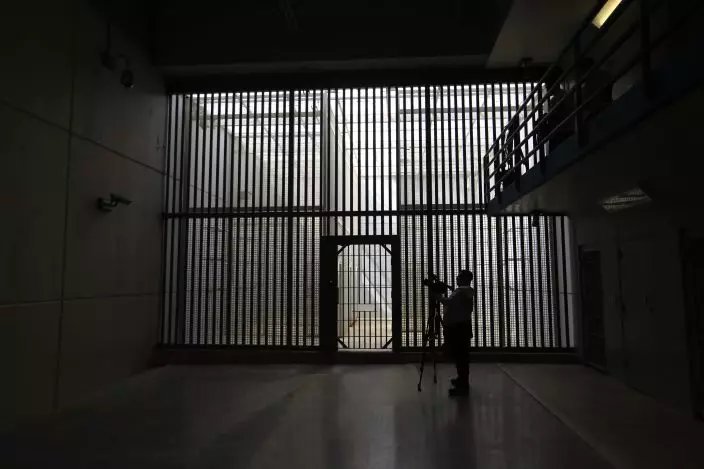
A journalist films the now closed Laguna del Toro maximum security facility during a media tour of the former Islas Marias penal colony located off Mexico's Pacific coast, Saturday, March 16, 2019. Bars and cells were limited to the maximum security facility because the surrounding ocean effectively prevented escape. (AP PhotoRebecca Blackwell)
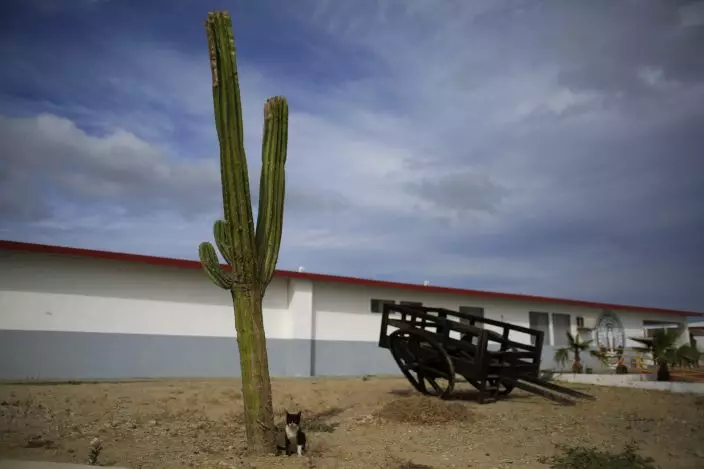
A cat sits by a cactus at the now closed Laguna del Toro maximum security facility during a media tour of the former Islas Marias penal colony located off Mexico's Pacific coast, Saturday, March 16, 2019. The colony was far from a tropical paradise for the inmates, where they weren't allowed to go the island's beaches, led a fairly regimented life with designated areas, bunk beds in small houses, and 5 a.m. morning wake-up calls. (AP PhotoRebecca Blackwell)
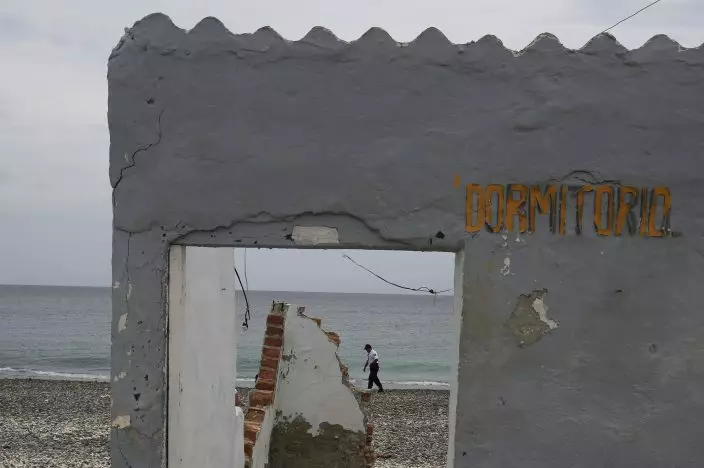
A prison guard walks on a beach past a dilapidated structure with the Spanish sign: Bedroom," during a media tour of the now closed Islas Marias penal colony located off Mexico's Pacific coast, Saturday, March 16, 2019. When Hurricane Willa made a direct hit as a Category 3 storm, it caused about $100 million in damages to the prison. (AP PhotoRebecca Blackwell)


